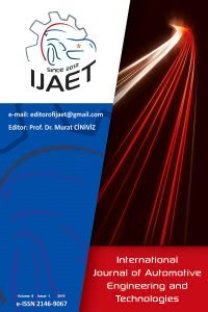A Comparative Study of Engine Performance and Exhaust Emissions of Biodiesel and Its Blends Produced from Waste Cooking Oil and Neutralized Waste Cooking Oil
A Comparative Study of Engine Performance and Exhaust Emissions of Biodiesel and Its Blends Produced from Waste Cooking Oil and Neutralized Waste Cooking Oil
___
- 1. Yaşar, B., Cost of biodiesel production in Turkey and problems. VII. National Clean Energy Symposium, UTES’2008, İstanbul, Turkey,197-204 (2008)
- Behçet, R., Aydın, S. and Çakmak, A., Using as Fuel for a Single Cylinder Diesel Engine of Biodiesels Produced from Vegetable and Animal Waste Oils, Iğdır Univ. J. Inst. Sci. &Tech. 2(4): 55-62 (2012)
- Savci, S., Eryilmaz, T., Yesilyurt, M.K., The effects of biodiesel on the environment. Journal of Selcuk University Natural and Applied Science, ICOEST Special IssuePart 2:635-646(2014).
- Şahin,S., Investigation of The Effect of Linseed Oil Biodiesel And Diesel Fuel Mixtures on Engine Performance and Exhaust. The Graduate School of Natural and Applied Science of Selçuk University the Degree of Master of Scıence in Agricultural Machinery, Konya, Turkey, 63pp (2013)
- Lapuerta M, Armas O, Rodríguez Fernández J., “Effects of biodiesel fuels on diesel engine emissions”, Prog. Energy Combust. Sci, 34:198–223 (2008) Çelikten, İ., Gürü, M., Improvement of Performance and Emission Criterias of Petro diesel and Rapeseed Oil Biodiesel with Manganese Based Additive, Journal of the Faculty of Engineering and Architecture of Gazi University, 26, 3, 643-648 (2011)
- Yılmaz, E., Solmaz, H., Polat, S., Altın M., Effect of The Three-Phase Dıesel Emulsıon Fuels on Engıne Performance and Exhaust Emıssıons, Journal of the Faculty of Engineering and Architecture of Gazi University 28 (1), 127–134 (2013)
- Chiaramonti, D.,Prussi, M., Buffi, M., Tacconi, D., “Sustainable biokerosene: Process route sand industrial demonstration activities in aviation biofuels”, Applied Energy, 136, 767– 774 (2014)
- Ulusoy, Y., Tekin, Y., Çetinkaya, M., Karaosmanoğlu, F., The Engine Tests of Biodiesel from Used Frying Oil, Energy Sources, 26:927-932 (2004)
- Keskin,A., Eksi, KA., The effect of using cornoil biodiesel on performance and emissions of diesel engine, C.B.U., Journal of Science s, 49 -55 (2006)
- Behçet, R. Aydın, S. İlkılıç, C. Aydın, H. Çakmak, A. V., Investigation of the Effect on Engine Performance and Exhaust of Emission Waste Frying Oil Methyl Ester in a Diesel Engine, The sixth International Advanced Technologies Symposium, Fırat University in Elazığ, Turkey (2011)
- Karadirek, E., Demircan, N., Yalçındağ, S., Biodiesel and Environment, Proceedings of the Energy Plants and Green Fuels Symposium, Izmir, Turkey :159-166 (2006)
- Yılmaz, E., Aksoy, L., Aksoy, F., Şahin, F., Uyumaz, A., “Experimental Investigation of the Effects of Biodiesel from Neutralized Waste Cooking Oil on Combustion, Performance and Emission”, Electronic Journal of Machine Technologies,13(4) 53-64 (2016) 1
- Eryılmaz, T., Öğüt, H., Oğuz, H., Bacak, S., Investigation of The Performance and Emission Values of Non-Standard Fuels at Diesel Engines, Journal of Agricultural Machinery Science, 6(1), 45-53 (2010)
- Eryilmaz, T., & Yesilyurt, M. K. (2015). Comparative analysis of fuel properties of biodiesels derived from sunflower oil, waste sunflower oil and neutralized waste sunflower oil. Fresenius Environmental Bulletin, 24(10), 3197-3204.
- Eryılmaz, T., Öğüt, H. The Effect of the Different Mustard Oil Biodiesel Blending Ratios on Diesel Engines Performance. Energy Education Science and Technology Part A: Energy Science and Research 2011 Volume (Issue) 28(1): 169-180.
- Chavan, S.B., Kumbhar, R.R., Kumar, A., and Sharma, Y.C. (2015). Study of Biodiesel Blends on Emission and Performance Characterization of a Variable Compression Ratio Engine. Energy & Fuels, vol. 29, no. 7, pp. 4393-4398. 10.1021/acs.energyfuels.5b00742
- Lapuerta, M.; Hernandez, J.J.; Gimenez, F. Evaluation of exhaust gas recirculation as a technique for reducing diesel engine NOx emissions. Proc. Inst. Mech. Eng. Part D J. Automob. Eng. 2000, 214, 85–93.
- Yayın Aralığı: 4
- Başlangıç: 2012
- Yayıncı: Murat CİNİVİZ
Ali Koray ÖZGÜN, Tanzer ERYILMAZ
Performance and Emission Characteristics of a Miller Cycle Engine
Can ÇINAR, Ahmet UYUMAZ, Suat SARIDEMİR, Oğuz K. DEMİRCİ
Hakan ÖZCAN, Abdülvahap ÇAKMAK
Oğuz Kürşat Demirci, Ahmet Uyumaz, Suat SARIDEMİR, Can Çınar
Hakan Özcan, Abdülvahap ÇAKMAK
Cihan BAYINDIRLI, Mehmet ÇELİK
Ali Koray Özgün, Tanzer Eryılmaz
The Experimentally and Numerically Determination Of The Drag Coefficient Of A Bus Model
